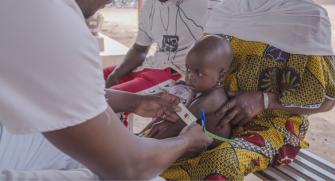Stimnut: An innovative community-led research action of psychosocial stimulation intervention to improve the management of child malnutrition in Koutiala, Mali
Acute malnutrition, alone or in combination with other diseases - malaria, diarrhea, respiratory tract diseases, so-called opportunistic infections - remains one of the leading causes of mortality among young children in Mali. In 2022, the prevalence of global acute malnutrition and severe acute malnutrition were 11.5% and 2.6% respectively in the Koutiala health district (1).
Beyond nutritional management
The management of malnourished children is based on medical treatment and nutritional care. But severe acute malnutrition (SAM), particularly in the first 1,000 days of life, has other serious consequences, including increased vulnerability to infection and diseases, increased early mortality, and motor and cognitive impairments, associated with behavioral and communication problems.
Early psychosocial stimulation with disadvantaged infants can lead to short- and long-term benefits in cognitive and social development. Programs with multiple components, including health, nutrition, and psychosocial stimulation have shown to be the most successful at enhancing the rehabilitation of severe acute malnourished (SAM) children. The STIMNUT study assesses the feasibility of integrating an adapted version of the ‘Follow-Up of Severe Acute Malnourished children’ (FUSAM) protocol (2) developed by Action Contre la Faim into the Médecins Sans Frontières (MSF) Therapeutic Feeding Programme in Koutiala (Mali) for SAM children aged 6-23 months and their primary caregivers.
-
Sagara JA. Indicateurs de santé chez les enfants de moins de 5 ans dans le district Juillet 2022 Rapport d’enquête. Epicentre. MSF; 2022.
-
Le Roch K, Tofail F, Bizouerne C. Research Brief FUSAM : A Nutrition and Psychosocial trial for Treatment of Children with Uncomplicated Severe Acute Malnutrition in Nepal. Action Contre la Faim; 2018.
The first results
Methods
A mixed-methods study was implemented between July 2022 and May 2023 in two outpatient health centres and at Koutiala General Hospital.
An adaptation of the PRECEDE-PROCEED conceptual framework was used to adapt, implement and evaluate the psychosocial stimulation intervention. The study was divided into 3 successive phases:
- An initial assessment of the situation at community level,
- Contextual adaptation of the FUSAM protocol using an approach derived from participatory action research (PAR) and
- Implementation of the adapted intervention and evaluation of its feasibility and acceptability.
Quantitative and qualitative data were collected during phases 1 and 3 from a variety of people: parents of children with SAM, health workers involved in the nutritional management of children, psychosocial workers who delivered the sessions, etc. These data were then analysed and analysed in order to identify the most appropriate intervention. These data were then analysed and interpreted simultaneously. During the PAR process, various stakeholders, including social workers, health professionals, parents of children with SAM, traditional healers, representatives of ministries and other NGOs worked together to adapt the intervention in concrete terms. More than 50 people took part in this process during working meetings moderated by a Malian association for awakening and development (AMEDD).
Results
The results of the first phase were used to inform how to adapt the intervention during the second phase. The PAR process produced three types of results: the FUSAM manual was adapted to the Koutiala context, taking into account local practices and customs; recommendations for implementing the intervention were made by the committees, including, for example, the inclusion of a launch ceremony to involve household decision-makers and the community. Finally, this process also enabled the authorities, local decision-makers and health workers to raise awareness and take ownership of the intervention.
During phase 3, a total of 149 psychosocial stimulation sessions (122 individual and 27 group; 18 sessions at the hospital and 131 at the cscom) were given on a weekly basis to the 36 families included by the team of 3 psychosocial workers (TPS) supervised by an online psychologist trainer. Eight other carers (husband, nephew, brother-in-law, father-in-law, uncle) attended one or more sessions with the mother.
Overall, the intervention was very much appreciated by the mothers, the main carers and the people delivering the intervention. Mothers' acceptance of the psychosocial stimulation sessions increased as the intervention progressed, due to the positive changes observed in their children's well-being, in their relationship with their children and in their relationship with their close circle (husband and extended family). The StimNut experience was also an essential resource in deconstructing the prejudices of healthcare staff towards mothers of MAS children and in building a relationship of trust between carer and cared-for.
The results showed that integrating a psychosocial intervention into an existing nutrition programme was feasible in a low- and middle-income country, in partnership with local stakeholders and health professionals, and is strongly encouraged. This type of initiative aims to strengthen child nutrition care systems and deserves to be continued.







